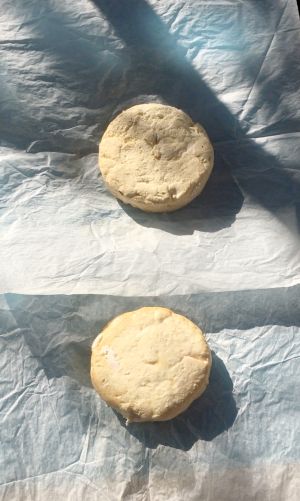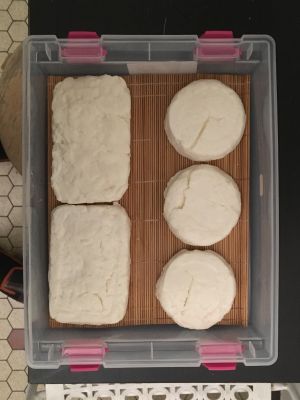September 2019 | Normandie smoked cheese in Paris
Rygeost cheeses
| Milk origin | Milk processing and curdling | Starter | Molding | Ripening time and process |
|---|---|---|---|---|
| Normandie full cow milk, unpasteurized. | Powdered animal rennet in re-heated milk, 24h curdling. | No lactic ferments nor starter culture. | Homemade mold from drilled plastic containers where the cheeses spent a few days without being pressed. | - Turned daily the first week. - days outside in aerated box before dry salting on both faces. - 4 days in fridge before smoking for 1 hour with hay. - Kept in fridge 1 more week before serving (2 months for extra batch). |
This cheese recipe was inspired by a Danish smoked cheese called Rygeost. It is crucial to let the cheese rest at least one week after smoking, so that the burnt taste does not take over on the freshness of the soft cheese taste. The cheese should not be over-ripen, but it can be kept in the fridge for 2 weeks as the smoke prevents mold to develop on its rind. 2 batches of this cheese were made in Paris before to be served in Amsterdam on the 4th of October for a performance dinner called The Soft Protest, re-chewing & Digest. A third batch was kept unsmoked and ripen for 2 month.
- Error creating thumbnail: File missing
- Error creating thumbnail: File missing
- Error creating thumbnail: File missing
- Error creating thumbnail: File missing
February 2020 | Vexin cheeses in Paris
Soft blue cheese attempt
| Milk origin | Milk processing and curdling | Starter | Molding | Ripening time and process |
|---|---|---|---|---|
| Vexin full cow milk, unpasteurized. (Sourced from Laiterie de la Chapelle, Paris.) | Powdered animal rennet in re-heated milk, 24h curdling. | No lactic ferments. Attempt of starter culture transplantation from blue cheese (Penicillium roqueforti) on the squarish ones. | Homemade mold from drilled plastic containers where the cheeses spent a few days without being pressed. | - Turned daily the first week. - 3 days outside in aerated box before dry salting on both faces. - Sealed in aluminium paper. - 1 month ripening in fridge for 1 round sample. 3 months for the others. |
On the round ones, no small organism culture of any kind was added. The squarish ones saw their milk curdle with Penicillium roqueforti in it (bits of Bleu d'Auvergne AOC cheese in the milk). After being forgotten during the covid19 lockdown in France for 3 months, they gave the most unexpected results. Despite the aluminium paper in which they were sealed, the humid environment led mold develop itself to a much too large extent. As a result, the over-ripen round samples turned out to taste even more “blue-cheese-like” than the squarish ones. Furthermore, none of them develop the expected blue veins but rather spots of unwanted dark mold. On the positive side, both had a grainy/smooth texture akin to Roquefort cheese. Their smell and taste was strong but deliciously tart.
- Error creating thumbnail: File missing
- Error creating thumbnail: File missing
- Vexin-cheeses ripen 2.jpg
- Error creating thumbnail: File missing
April-May 2020 | Mont-Dore and experimental cheeses in La Bourboule
Mont-Dore cheeses
| Milk origin | Milk processing and curdling | Starter | Molding | Ripening time and process |
|---|---|---|---|---|
| Beans | Powdered animal rennet in re-heated milk, 24h curdling. | No lactic ferments. Attempt of starter culture transplantation from blue cheese (Penicillium roqueforti) on the squarish ones. | Faisselle yogurt plastic molds where the cheeses spent a few days without being pressed. | - 3 days outside in molds (covered with net). - 20 days of ripening in fridge. |
- .jpg
- .jpg
Bean-cheeses
| Milk origin | Milk processing and curdling | Starter | Molding | Ripening time and process |
|---|---|---|---|---|
| Beans | Powdered animal rennet in re-heated milk, 24h curdling. | No lactic ferments. Attempt of starter culture transplantation from blue cheese (Penicillium roqueforti) on the squarish ones. | Faisselle yogurt plastic molds where the cheeses spent a few days without being pressed. | - 3 days outside in molds (covered with net). - 20 days of ripening in fridge. |
- .jpg
- .jpg
Potato-cheeses
| Milk origin | Milk processing and curdling | Starter | Molding | Ripening time and process |
|---|---|---|---|---|
| Beans | Powdered animal rennet in re-heated milk, 24h curdling. | No lactic ferments. Attempt of starter culture transplantation from blue cheese (Penicillium roqueforti) on the squarish ones. | Faisselle yogurt plastic molds where the cheeses spent a few days without being pressed. | - 3 days outside in molds (covered with net). - 20 days of ripening in fridge. |
- .jpg
- .jpg

